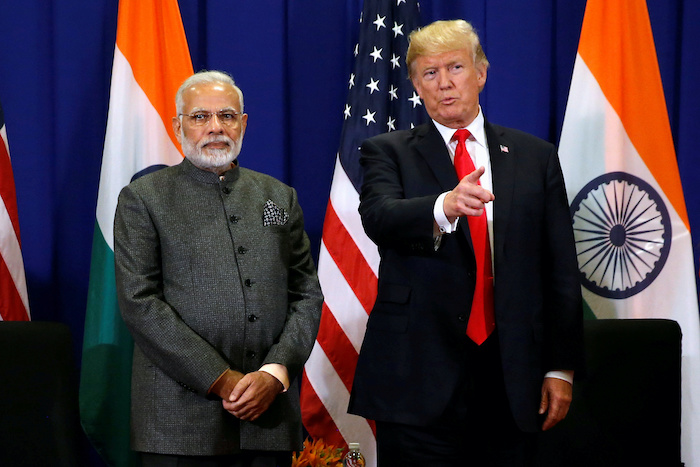India could be the next country to reach a quick trade deal with the US, after Britain and the Trump Administration signed a tariff agreement this week.
New Delhi has offered to slash its tariff gap with the US to less than 4% from nearly 13% – in exchange for an exemption from President Donald Trump’s “current and potential” tariff hikes, according to sources who spoke to Reuters.
This would mean that the average tariff differential between India and the US, calculated across all products without weighting for trade volume, would be reduced by 9 percentage points, in one of the most sweeping changes to bring down trade barriers in the world’s fifth largest economy.
ALSO SEE: Fear of Huge Job Losses Led to China’s Move to Discuss Tariffs
The United States is India’s largest trading partner, with bilateral trade totalling some $129 billion in 2024. The trade balance is currently in favour of India, which runs a $45.7 billion surplus with the US.
Trump announced on Thursday his administration’s first “breakthrough deal” with Britain. It lowers average British tariffs on US goods but keeps in place the 10% base tariff imposed by Washington on British goods, likely setting a template for Washington’s approach with other trading partners.
Last month, Trump announced a 90-day pause on his long-planned reciprocal tariffs on global trading partners, including a 26% tariff on India, while his administration negotiates trade deals. A 10% base tariff continues to apply to India and many other nations during the pause.
After the UK, India and Japan are the next two nations in line to finalise a deal, a third Indian government official said. “We will see which one crosses the line first.”
To achieve this, New Delhi has offered to reduce duties to zero on 60% of the tariff lines in the first phase of the deal which is under negotiation, said the first two sources, both Indian government officials familiar with the matter.
India has offered preferential access to nearly 90% of goods imported from the United States, including the reduced tariffs, one of the two officials said.
Details of India’s offer to slash the tariff gap and what it has asked the US in return have not been previously reported.
A delegation of Indian officials is likely to visit the US later this month to take the negotiations forward, a fourth official said, adding that India’s trade minister, Piyush Goyal, might visit too but his plans were not finalised.
All four government officials did not wish to be identified as details of the negotiations are private and sensitive. India’s trade ministry, which is leading talks, did not respond to a request for comment.
India seeks preferential access
Alongside tariff exemptions, India has also asked for preferential market access for key export sectors including gems and jewellery, leather, apparel, textiles, plastics, chemicals, oilseeds, shrimp, and horticultural produce such as bananas and grapes.
“Preferential market access for India would mean better terms of trade for these goods compared to America’s other trading partners,” the first official said.
India is also looking for concessions that would give it an edge over competitors in supplying “products of interest”, the official added.
However, India’s expectation of being exempted completely from tariffs on its exports is at odds with the deal struck between the US and Britain.
To make the deal more attractive for Washington, India has offered to ease export regulations on several high-value US exports, the first official said.
These include aircraft and parts, luxury cars and electric vehicles, telecom equipment, medical devices, hydrocarbons, wines and whiskey, berries, prunes, certain chemicals, and animal feed.
Beyond tariffs, India has also asked the US to treat it at par with other top US allies such as Britain, Australia and Japan in critical technology sectors such as AI, telecoms, biotech, pharmaceuticals, and semiconductors.
Washington’s desire to share critical technologies with allies like India has often faced hurdles due to the US government’s own restrictive rules.
- Reuters with additional editing by Jim Pollard
ALSO SEE:
Pakistan Worries Loom Over Foreign Investors’ $5bn India Buying Spree
US Says One of its First Trade Deals Will be With India
Apple Will Shift Production of US iPhones to India, FT Says
Apple Stock Soars as iPhones Airlifted From India ‘to Beat Tariffs’
India Likely to Defy Auto Lobby, Cut EV Levies to Appease Trump
India Eyes $23bn in Tariff Cuts on US Imports to ‘Save Exports’
Fears of Reciprocal Trump Tariffs Wipe $180bn Off Indian Stocks
























